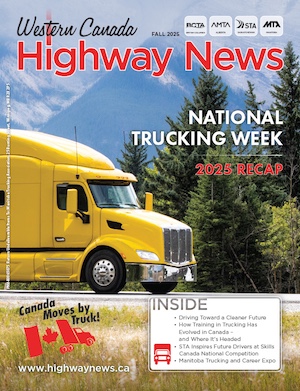National Trucking Week is upon us and, although 2021 got off to a rough start, we have plenty to be grateful for this year.
A return to normal has been more than welcomed back into our lives and truck drivers, who were tested to the pandemic limits like never before, got to embrace a much-deserved moment in the spotlight as essential workers. This will certainly be a National Trucking Week to remember, as a sincere appreciation for truck drivers has grown out of the realization that our country cannot function without this critical piece of the supply chain.
Although the initial wave of the pandemic brought a drop in employment of truck drivers, according to Trucking HR Canada’s June 2021 Labour Market Snapshot employment has now rebounded to pre-COVID levels. Job prospects for drivers are at an all-time high but the number of job seekers remains substantially lower, cultivating the perfect storm our industry has not been able to escape for many years. The driver shortage is not a new phenomenon, and it is slated to get worse. By 2023, Canada is expected to have over 25,000 truck driver vacancies – an increase of over 25% compared with 2019.1 As grateful as we are for the truck drivers that we have, we simply need more.
Several factors are contributing to this growing shortage. A combination of shifting demographics, historical compensation and benefits, high training and insurance costs, our environmental reputation, the eCommerce boom, and competing industries (to name a few) have all given rise to the immense challenge we are faced with.
With many reasons for the shortage, there isn’t one solution; however, our industry has taken a variety of concrete steps to move forward. Programs such as YWCA’s Changing Gears, Trucking HR Canada’s initiatives, and cooperative ventures between companies and individuals have shown real progress in attracting and retaining new talent. The BC Trucking Association (BCTA) will continue to advocate for wage subsidies and funding to train new drivers and collaborate with partners and organizations to ensure that interested carriers and drivers can access those funds.
The future is looking bright as we race to bring zero-emission commercial vehicles to our highways, making the trucking industry as dynamic and innovative as any other. Emerging technologies are transforming the nature of work in our sector, creating new career opportunities that have the potential to appeal to a broader pool of candidates. This new generation of workers will reshape how we think about our future workforce.
We need to recognize the “romance” of the open road has been replaced with the reality of congestion, freedom with time demands, and flexibility with regulation. The expectations of a new generation of workers are different, and it really does not matter if those expectations are “reasonable.” Those expectations are what we, as an industry, have to meet.
Our collective work tells us all we need to know – to recruit and retain a new generation of drivers, we must provide our colleagues with a sense of contribution to a greater good, a commitment that we are sustainable, and treat them not as we would like to be treated, but how they themselves wish to be.
Contribution to a greater good has never been as clear as it is this year. Our industry kept Canadians fed, warm, and safe during a global pandemic. We must continue to talk about the role we played.
Our commitment to sustainability is real. Reduction in fuel burn via the utilization of telematics, training, and equipment enhancements is underway. Deployment of hybrid and zero emission vehicle technology is also on the horizon.
What we must do better on is adapting to how new drivers, your new employees, want to be treated. Regardless of your experience or perception, Millennials, Gen Z’ers, and Gen Alphas are going to staff our fleets in the years to come (or not). We cannot kid ourselves; we are in a fight to attract skilled candidates to our industry in every corner of the country. We need to change how we interact with our employees and through them, our customers. This includes shorter hours of work, flexible work schedules, job sharing, limited duties and limited routes. It is not all about salary, but more about what we expect from
new entrants. Years ago, a common question in the recruitment process was “What will you bring to the company?” More often, the question we are now being asked is “What is the company bringing to me?” We’d best be ready with focused answers and, most importantly, be ready to listen and act when we ask the most important question of all: “What can we do for you?”
To the truck drivers who work tirelessly to keep the country’s freight moving, BCTA thanks you for everything that you do.
Happy National Trucking Week!
Reference
1 Trucking HR Canada. (2020). The Road Ahead: Addressing Canada’s Trucking and Logistics Labour Shortages. Ottawa: Trucking HR Canada.


 1-866-985-9791
1-866-985-9791



